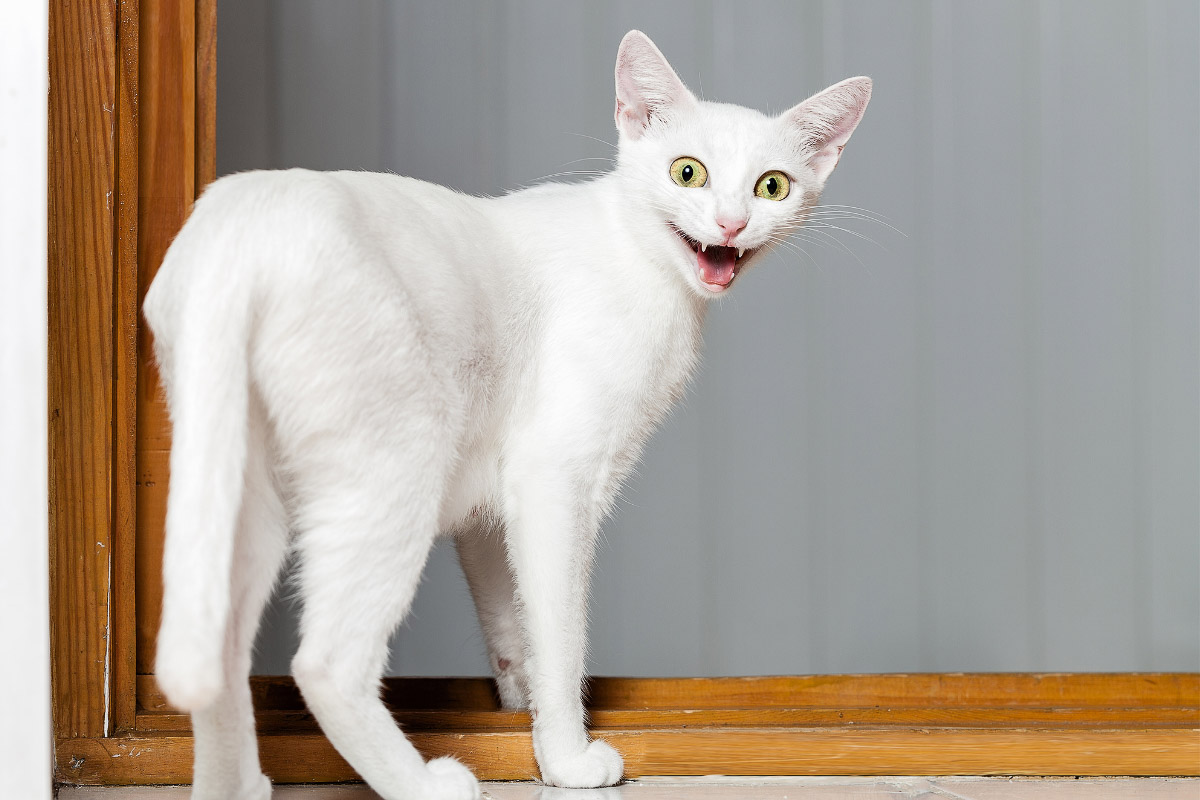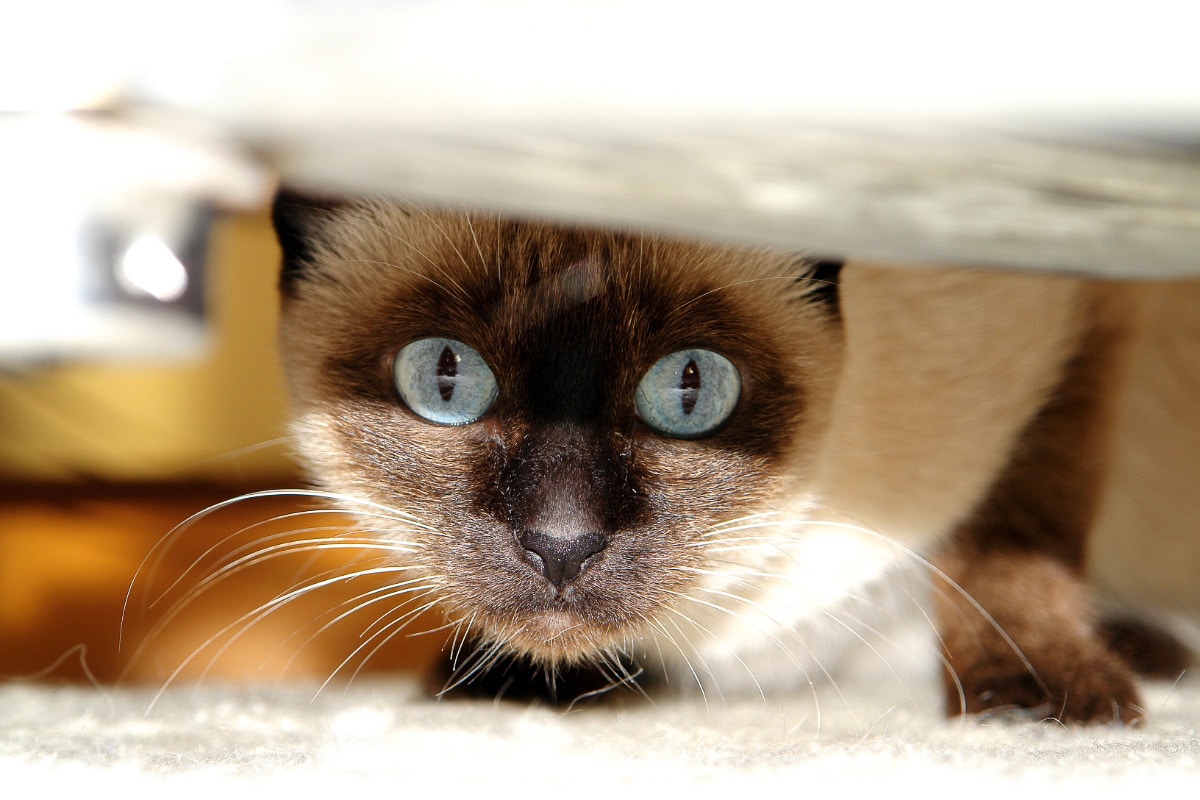
If you’re a cat parent to a kitty that meows throughout the night, you may be concerned about this feline behavior or simply fed up with getting next to no sleep. Otherwise known as night vocalization or night-calling, these midnight symphonies are not uncommon behavior.
And you’re not alone, as many cat lovers are dragging themselves out of bed to quiet a feisty feline. Either way, when it comes to our fur babies, it’s best to rule out any troublesome causes and rest easy at night, knowing they are healthy and happy.
So, why does my cat yowl at night when I go to bed? After this little nugget of information, you and your cat can have sweet dreams again? Time to dig in!

Contents
Why Does My Cat Meow at Night When I Go to Bed? 12 Reasons
Much like a human baby, a cat’s nighttime vocalizations can signal a need like hunger, thirst, loneliness, or even pain. Once you’ve found the root issue causing the cries and moonlit fussing, you can try to solve the problem accordingly.
However, these should never replace a vet’s expertise. Much like us, our kitties could be crying from illness or pain. Once these are ruled out, consider some of the tactics below to curb your cat’s moaning at night.
1. Old Age
Aging affects us all, human or animal, and cats are, unfortunately, no different. As they age, cats can suffer from age-related changes in their brains, and cognitive dysfunction can result.

Cognitive Dysfunction Syndrome in older cats can produce a variety of symptoms, one of which is your cat meowing at night.
If your furry friend is a senior citizen and you suspect this to be the case with them, then seeing a vet for a definitive diagnosis is best.

As they become increasingly disorientated, it’s not uncommon for geriatrics to wander their home and cry, particularly at night. The excessive meowing may also intensify as their hearing diminishes.
The best thing you can do to help your aging friend is to be with them. If your kitty doesn’t already sleep in the room with you, inviting them into the space can calm them. Knowing you’re around can help mitigate why cats cry at night, especially your fluffball.
2. Mating Behavior
Love is in the air! It’s no secret that male and female cats prowl and yowl when it’s time to mate. Why do female cats cry at night? In short, they may be on heat and making a noise to let the boys in town know they’re available for mating.

And if you’re wondering, “Why does my male cat cry at night?” they may be trying to gain a female’s attention by vocalization.
This is a natural process, but if kittens are not in your future plans, then it’s strongly advised that you get your males neutered and females spayed.

This will not only prevent unwanted kittens but also:
- Decrease their need to look for a mate, so they won’t roam as far
- Reduce the risk of mammary gland, ovarian and uterine cancer (females)
- Reduce the risk of prostate disease and testicular tumors (males)
- Help the cat to live longer.
3. Medical Condition
If your kitty isn’t feeling well, it may roam the house and vocalize its distress while trying to find a comfortable place. A variety of illnesses, including hyperthyroidism, can cause a cat to feel restless, irritable, thirsty, or hungry.
They often deal with this discomfort by wandering the house and meowing. So if your cat’s randomly crying at night, it might not be so random after all.

Consulting a vet to get a health check-up is wise. This is because excessive vocalization can be a sign of illness. So getting a professional opinion will put your mind at ease and your feline’s nighttime acapella session on mute.

4. Their Litter Box is Not Up to Scratch
A dirty litter box could certainly be the reason for a whining kitty. Cats prefer a fresh and clean litter box when they go to do their business. Scooping it nightly before bedtime is a good routine to establish and help resolve one of the reasons why cats meow at night.

Aside from daily and nightly scooping, their box should be dumped weekly and washed thoroughly with a safe, environmentally friendly litter box cleaner.
A glistening ablution corner could go a long way toward keeping your furry friend happy and quiet at night.

5. Lights or Sounds Are Disturbing Their Sleep
You may be asking, “Why is my cat crying at night?” and the answer could be as clear as day. Like humans, cats prefer a calming, undisturbed space to sleep, so your pet may complain throughout the night because of an annoying visual or audible disturbance.
This can include light filtering through somewhere obscure, LED lights or computer screens, and laptops that haven’t been shut off or closed.

Cats also have incredibly sensitive hearing. They can hear sounds of up to 64,000HZ (while humans hear around 20,000HZ and dogs 45,000HZ), so you may not even hear what’s bothering your kitty at first. (Zolpidem)
From a buzzing diffuser to a rattling refrigerator, there are plenty of potentialities, so a trial and error method will work here.

6. They Are Feeling Neglected
Some cats cry at night out of loneliness, boredom, or anxiety. As independent as these felines can be, they also can enjoy interaction and companionship.
This bonding may have fallen by the wayside, especially if you have a busy schedule or you’ve been at work all day. Giving your kitty plenty of playtime and affection before bed is a sure way to keep them happy.

Incorporating some one-on-one time ensures they go to bed less lonely or stressed. This also means they’re less likely to find an inconvenient time to tell you about their unhappiness.

Lavishing them with love should be fun, right? So grab some cat toys and get ready to romp.
7. They Feel Trapped Inside
No one wants to get out of a warm bed to soothe their crying kitty by letting them roam outside. Specifically, outdoor cats may start feeling frustrated if they are not properly physically and mentally stimulated.
When it comes time for you to turn in, they may feel a touch hard done by and commence vocalizing at all hours of the night.

If your cat is used to spending its time outdoors, which is the case for some breeds like Maine Coons, it may end up feeling trapped when spending the night inside.
Letting your cat out for short periods, if it’s safe, will give them a chance to expel some energy outside or even settle their curiosity. That said, it must be for another reason if your cat’s moaning outside at night.

8. They’re Looking for Attention
This reason should only be considered if you’ve already ruled out medical reasons and ensured their needs are being met. This nighttime vocalizing could simply be a way to get your attention.
The best way to handle this is to refrain from responding to your cat’s nighttime meowing. If your cat meows at you, do your best to ignore it.

Cats can easily form habits that are undesirable if not tended to. It reinforces their bad behavior if they incessantly meow at night and get rewarded with a neck scratch from their beloved human parents.
As hard as it may be to ignore your baby’s cries, they must learn that no unnecessary meowing will get you out of bed. Is this guaranteed to work?

Most likely, yes, but it may take a few weeks, so stick with it and don’t expect immediate results. In the meantime, earplugs will become your best friends while the caterwauling continues.
9. Breed Tendencies
While cats will be cats, they can also be extremely unique in their ways and tendencies. It’s important to know what breed your furry friend is so you can be best informed about their personalities, behavior, character traits and any breed specific conditions.

According to bayside cat resort, some of the noisiest cat breeds are:
- Sphynx
- Bengal
- Siamese
- Burmese
- Tonkinese
- Maine Coon

10. Their Body Clock Needs Resetting
Cats are crepuscular creatures, which means they are most active at dawn and dusk. Although it’s not ideal for their sleeping human carers, crepuscular activity stems from dawn and dusk being the best time for cats to hunt birds and mice (as their wild ancestors would have done).
While they are naturally wired for activity during our slumbering hours, it is possible, with a bit of patience and diligence, to reset their body clocks to suit your snoozing schedule better.

How can we do this, though? Active play is the way to go. Provide your kitty with stimulating toys while you are away or play with them between naps.
This will help your kitty stay alert during the day. And when night falls, it’s time to pull out all the stops. Schedule a hearty play session with your feline friend to further tire them out.

Following this raucous time with their evening meal also makes it easier to push dinner time back by a bit, reducing any cat crying at night for a late-night snack.
Rather than allowing them to graze freely throughout the day, structuring mealtimes go a long way toward creating routines and healthy behavior.
11. They’re Asking for Essentials
A simple factor you can rule out is whether their bowl is filled with fresh water before you turn in for the day. Middle-of-the-night meowing could be your cat’s way of saying they’re hungry or thirsty.

However, after their evening meal their nighttime crying for food should end. Be sure to invest in high-fiber cat food and even some high-quality cat treats to ensure they remain full for longer.

We still want to eliminate any crying out at 03:00 for a drink of water, though, so check on those water bowl levels before bed.
12. Change of Environment
Lastly, a common reason why a cat cries at night may simply be that it’s having trouble adjusting to a new environment. Cats can get quite stuck in their ways, and if those routines are disrupted, it can result in some protesting from their side.

If you’ve moved houses or even had some lifestyle changes like new pets introduced to the home, some meowing from your feline is totally normal.
Try to ease them into any drastic changes and keep certain elements in their immediate surroundings the same. This could be something like their cat bed or their favorite toys.

These familiar objects and scents may help soothe them during the adjustment period.
Why Do Cats Cry at Night? A Brief Conclusion
Don’t allow proper sleep to become a thing of the past or a distant memory. If your four-legged companion is preventing you from catching those Z’s, then there are plenty of channels to get to the bottom of those mysterious meows.
There’s no need to be tortured throughout the night. If you’ve ruled out medical issues or ailments, you needn’t worry or lose sleep over the other possibilities. If it’s not medical, why do cats meow at night can be resolved quite simply, in all honesty.
And remember, your feline babies are more resilient than you think – after all, cats always land on their feet.

Suggested Reads:

